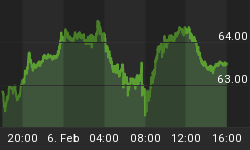UNEDITED
The Federal Reserve raised interest rates by 25 basis points to 2.75%. While, the rate increase was widely expected, the statement was more hawkish then expected. The Fed continued to say that long-term inflation was "well contained," but added, "pressures on inflation have picked up in recent months and pricing power is more evident. The rise in energy prices, however, has not notably fed through to core consumer prices." Later in the release the Fed said that "underlying inflation expected to be contained." Last month, underlying inflation was expected to be "relatively low." The more hawkish statement led traders to price in the possibility of a 50 basis point hike in one of the next two meetings. Besides acknowledging building inflation pressures, the Federal Reserve increased its view on economic growth. Just six weeks ago, the Fed said that "output appears to be growing at a moderate pace." Now the economic "output evidently continues to grow at a solid pace." The Federal Reserve continues to believe that policy accommodation can be removed at a "measured" pace.
The latest producer and consumer price indexes confirms the Fed's recent shift. Producer prices increase by 0.4% in February from January and 4.7% over the past year, both were 10 basis points higher than forecasts. During the recession in 2001, the producer price index fell by 3.1%. Since bottoming in January 2002, producer prices have increased by 10.7%. This has been the largest increase in producer prices over a three-year span since early 1992. Several components have increased significantly. Consumer goods increased 5.4%, led by gasoline and residential gas. Chemical prices have had double-digit price increased for six consecutive months. This was the longest stretch of double-digit increases since the late 1980s. Rubber and plastic prices increased 7.3% from a year ago, this was the largest year-over-year increase since June 1981. Furniture and durable prices increased 3.1%, highest since October 1989. While textile prices increased only 1.7% over the past year, it was the highest rate since January 1996. Appliances prices increased at the fastest pace since 1993, and was positive for only the second month since 1999.
Its likely that higher producer prices will increase consumer prices in the future. The consumer price index increased by 0.4% in February from last month and rose 3.0% year-over-year up 3.0%. This was the fifth consecutive month that CPI was 3% or more higher than the year ago period. The core CPI, excluding food and energy costs, was up 2.4%, highest since 2002. Owners equivalent rent increased by 2.5% over the past year.
While the government calculates that housing inflation was only 2.5%, the National Association of Realtors reported that the median price of existing homes sold increased by 13%. Additionally, it reported that existing homes sold at a 6.79 million annual rate. This was slightly below the 6.82 million rate last month, but higher than the 6.7 million forecasted.
The strong housing market continue to be a boon for the major homebuilders. KB Home announced that first quarter revenue increased 21%, EPS soared 61%, beating Wall Street estimates by $0.24 per share. Deliveries increased by 11% and the average selling price rose 10%. Net orders increased by 23%, which pushed up the backlog up by 58% on a dollar basis. Its current backlog is over 75% of the revenue Wall Street expects the company to have for the rest of the year. Better pricing helped gross margin expand by 320 basis points to 25.5%, which is the highest in at least five years. Stronger gross margins offset a lower number of deliveries, which was impacted by heavy rainfall in the West.
Lennar reported similar results for its first quarter. Revenue increased 29%, EPS rose 39%. Higher prices were attributed to higher sales in the West, which also was the catalyst for a 210 basis point expansion in gross margin. Revenues were driven by a 17% increase in deliveries coupled with a 14% increase in average selling price. New orders only increased by 9% for the homebuilder, but backlog has increased by 32%. Backlog represents 56% of forecasted full-year revenues.
Fallout continues in the auto industry. Delphi reported that it cut its dividend by 57% to just three cents per share. The company expects to lose $350 million this year and needs to conserve cash. Additionally, Dana announced that first quarter earnings per share will be $0.11 - $0.13. The company previously expected earnings of $0.17 - $0.23 per share just a month ago. On a more positive note, GM and Ford announced that they expect March sales to be better than the first two months of the year. GM said sales would be within one percent of last march, while Ford said March sales will be equal or better than results last year. Both companies hope to de-emphasize incentives in 2005. Speaking at the New York Auto Show, Robert Lutz, GM's chairman, said, "We did a lot of things in '04 to help boost sales&We're now in the payback period. It's like you're getting off what was a bad habit. You're going through withdrawal." Actually, GM did a lot to boost sales over the past three years and the "withdrawal" is likely to be much more significant than currently anticipated. Lutz also described GM's health-care expenses for employees and retirees as "one big scary thing."
Just as GM and the other automakers boosted incentives to maintain auto sales over the past several years, the Federal Reserve has been overly accommodative. This has boosted economic growth along with adding a massive amount of liquidity. As the excess liquidity gets extracted out of the economy, the "withdrawal" will likely have financial and economic ramifications.















